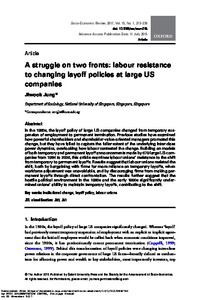A struggle on two fronts: labour resistance to changing layoff policies at large US companies

2017
15
1
January
213-239
redundancy ; trade union ; structural change ; strike
Unemployment
https://doi.org/10.1093/ser/mwv015
English
Bibliogr.
"In the 1980s, the layoff policy of large US companies changed from temporary suspension of employment to permanent termination. Previous studies have examined how powerful shareholders and shareholder-value-oriented managers promoted this change, but they have failed to capture the fuller extent of the underlying inter-class power dynamics, overlooking how labour contested the change. Building on models of both temporary and permanent layoff announcements made by 679 large US companies from 1984 to 2006, this article examines labour unions' resistance to the shift from temporary to permanent layoffs. Results suggest that labour unions resisted the shift, both by bargaining with firms for more reliance on temporary layoffs, when workforce adjustment was unavoidable, and by discouraging firms from making permanent layoffs through direct confrontation. The results further suggest that the hostile political environment in the 1980s and the early 1990s significantly undermined unions' ability to maintain temporary layoffs, contributing to the shift."
Digital
The ETUI is co-funded by the European Union. Views and opinions expressed are however those of the author(s) only and do not necessarily reflect those of the European Union or the ETUI.